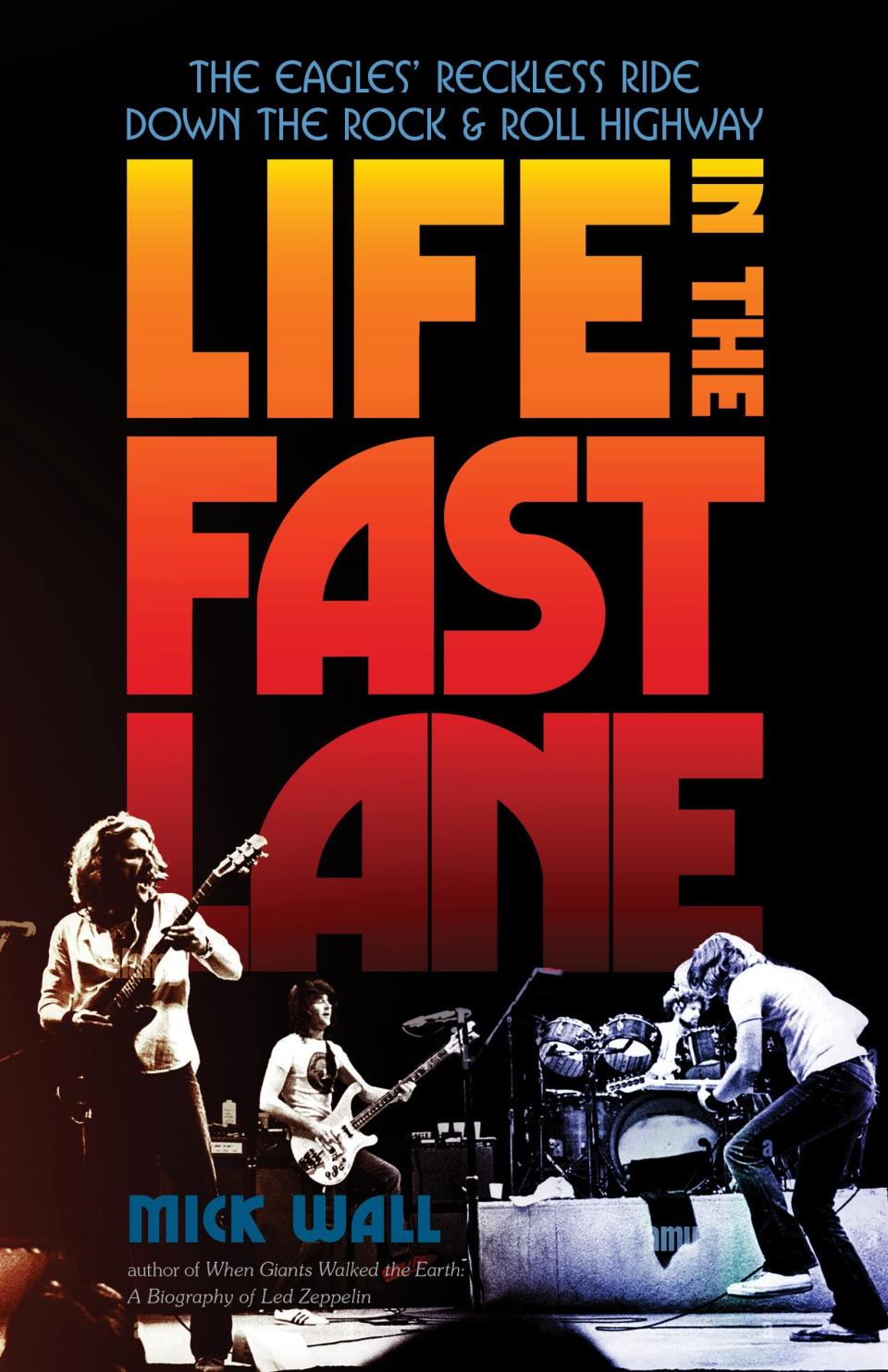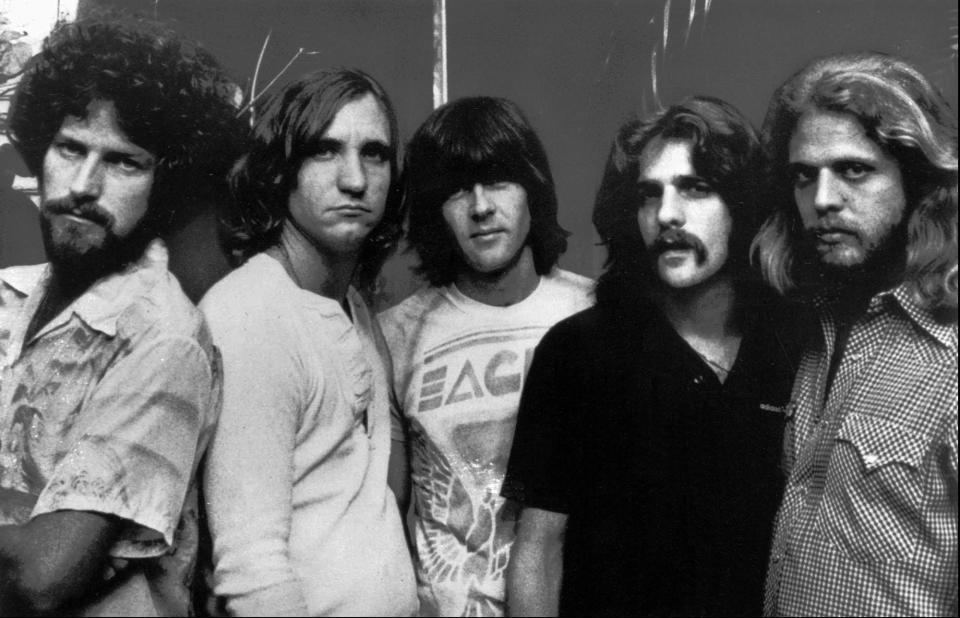From mega-hits to fractured friendships, 'Life in the Fast Lane' details the Eagles' ride

No one from the Eagles approved “Life in the Fast Lane.”
Author Mick Wall makes that clear from the first words in his book subtitled as the band’s “Reckless Ride Down the Rock & Roll Highway.”
But that didn’t deter longtime British music journalist Wall – whose resume includes biographies about Guns N’ Roses, Bono, Led Zeppelin and Foo Fighters – from painstakingly researching more than 300 pages worth of details about a band that developed from Laurel Canyon troubadours to holding the highest certified album in Recording Industry Association of America history (“Their Greatest Hits: 1971-1975,” now 38 times platinum).
The breezy book (Diversion, on sale now) draws from Wall’s 40-plus years of archived interviews with members of the band, as well as other major players from that period (managers, record company executives, tour crew, concert promoters and “friends of friends”) and interviews in magazines ranging from Rolling Stone to Crawdaddy to Vanity Fair.
USA TODAY booklist returns: How to find the list made for book lovers

Purchases you make through our links may earn us and our publishing partners a commission.
While methodical in its first half as Wall unspools the intertwined relationships of the time among the Eagles, Jackson Browne, Linda Ronstadt and J.D. Souther, the second part (aka Side Two) drills into the Eagles’ crest, which still hinges on the antagonistic but loving relationship between Don Henley and Glenn Frey.
The rotating Eagles cast – originals Randy Meisner and Bernie Leadon, followed by Don Felder, Joe Walsh and Timothy B. Schmit – have their roles, but the band was undoubtedly the Don and Glenn Show.
Toward the end of the book, Wall reports from a June 22 concert in Hyde Park, London. Despite Henley being the only original member and Vince Gill and Deacon Frey filling in for Glenn, who died in 2016, “none of it matters to the huge crowd,” Wall writes, comparing the scene to a time machine.
That time machine will be in effect one last time: The Eagles recently announced their Long Goodbye tour, which will kick off in September.
Here are some tidbits from “Life in the Fast Lane.”

The Eagles’ 'Desperado' is a flop
The song is considered the first example of teamwork between Henley and Frey and the album of the same name is lauded by critics (except the Village Voice, which is of course the one review that buries into the psyches of Frey and Henley). But listeners who thrilled to the strummy “Take it Easy” don’t flock to an album filled with deep metaphors, Western themes and “cowboy allegories.”
The singles released from the record – “Tequila Sunrise” and “Outlaw Man” – fizzle on the charts, and “Desperado” isn’t even considered as a release to radio.
But the 1973 album marks a turning point for the Eagles. Label mate and friend Linda Ronstadt recorded a version of “Desperado” for her album “Don’t Cry Now,” adding “an enchanted touch” to the weary-woven ballad. Radio fell in love with Ronstadt’s rendition, but the Eagles’ label still balked at releasing the original version.
The band knew its next release would be make-or-break territory, reinspiring Henley and Frey, even as they crankily returned to London to work on two new songs with producer Glyn Johns, with whom they had a tempestuous relationship (his no-drugs-in-the-studio policy a prime source of irritation).
One of those songs would lead to the Eagles’ first No. 1 hit: “The Best of My Love.”
The tangled relationship between the Eagles and Fleetwood Mac
Two of the musical behemoths of the ‘70s faced off for the title of America’s most-adored band and the “marriage” between them “consummated” at a bicentennial show in Tampa.
Henley was smitten with Fleetwood Mac’s alluring new frontwoman, Stevie Nicks, even sending a limo filled with gifts – a stereo, records, flowers, fruit – to her Florida hotel. Back in Los Angeles, their relationship continued until Nicks became pregnant.
Henley “certainly didn’t force” Nicks into having an abortion, but she made the decision after realizing he probably didn’t want a long-term relationship. Nicks named the unborn child Sara, leading to the Fleetwood Mac song of the same name.
The relationship sparked a couple of musical classics: “Go Your Own Way” documents the vitriol between Nicks and former paramour/Mac singer-guitarist Lindsey Buckingham, and “Dreams” takes aim at Henley with the “players only love you when you’re playing” line. Both songs helped catapult Fleetwood Mac’s album “Rumours” to one of the best in music history.
‘Hotel California’ brought massive success and bruised egos
Frey and Henley wanted to write something cinematic, running with the idea of a guy pulling off a highway, entering a hotel and “strange people appear.” The title track was cemented by Henley’s lyric about how you can check out of the hotel whenever you want, but you’ll never escape fate.
Henley referred to “Hotel California” as a concept album, with the Eagles’ home state as its centerpiece with songs such as “The Last Resort” (which an awed Frey referred to as “Henley’s opus”) and the one about fleeting fame birthed from a volcanic riff from Walsh and a comment from the band’s drug dealer while driving too rapidly (“This is life in the fast lane!”).
But the creation of the album and ensuing snarl-fests in the studio led to injured feelings.
“Success changed everything,” Meisner says. “I just didn’t feel like I was part of the group at that point. … It was all business. The friendships were kind of gone.”
Check out: USA TODAY's weekly Best-selling Booklist
This article originally appeared on USA TODAY: Eagles biography 'Life in the Fast Lane' spotlights Henley, Frey
Solve the daily Crossword

